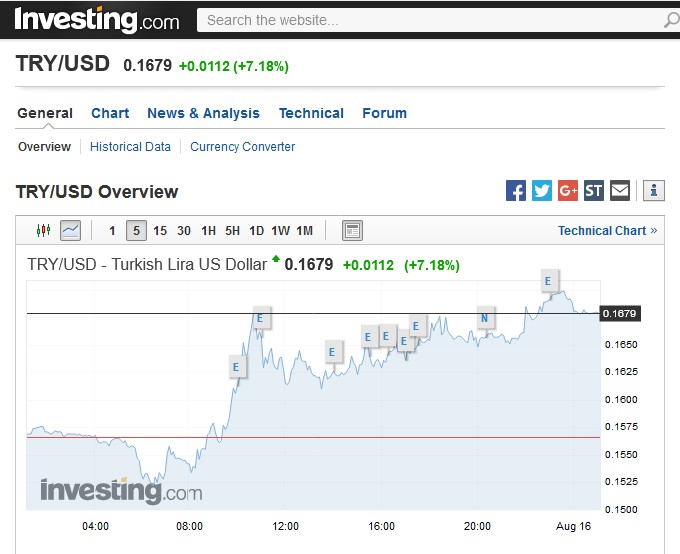The Turkish lira is enjoying one of its best days in more than year after jumping 7.2 percent against the dollar in Wednesday trading. The lira’s good fortune has come thanks to Qatar coming to its aid, pledging to invest $15 billion in the beleaguered economy to help it beat a biting currency crisis.
The generous offer came after Turkish president Erdogan hosted Sheikh Tamim bin Hamad, the emir of the Gulf state.
Even after the rally, the lira is still nearly 40 percent down against the greenback in the year-to-date.

(Click to enlarge)
Source: Investing.com
Turkey Escalates U.S. Row
Experts believe that the cash injection will help Turkey ride out a crippling currency crisis. In the long-run though, investors will be looking for more conventional measures including interest rate hikes that Erdogan has been resisting as “evil”.
Interestingly, Qatar’s helping hand has arrived on the same day that Turkey has escalated its diplomatic row with the United States by slapping heavy tariffs on American imports.
The retaliatory measures will see 140-percent tariffs imposed on American spirits; 120-percent tariffs on passenger cars and 60-percent tariffs on tobacco. Rice, coal and cosmetics will also face higher tariffs. Related: China's Most Powerful Weapon In The Trade War
Turkey has also taken extra steps to bar traders from betting against its ailing currency. Specifically, the country’s financial regulators have tightened rules around forex derivatives thus making it harder to short the lira.
Just last week, President Trump announced that he was doubling tariffs on Turkish steel and aluminum. Talks between Washington and Ankara to try and resolve the standoff have mostly come to naught. The lira tanked to an all-time low of 7.24 against the dollar as a result.
The tit-for-tat measures have been going on for some time now. The U.S. has been pushing for the release of Evangelical Christian pastor Andrew Brunson who is being held in Turkey on terrorism charges. Erdogan also recently ordered that the assets of two U.S. officials to be frozen in retaliation of sanctions imposed on Turkey’s justice and interior ministers over the cleric’s detention.
Turkey Stocks Crash, Emerging Markets Resilient
The plunging lira has dragged down a number of other key assets both in Turkey and adjoining markets. The iShares MSCI Turkey ETF crashed 21 percent alone, taking the Vanguard FTSE Emerging Markets ETF (VWO) down with it, an index comprising stocks from China, South Africa and other emerging economies and approximately $90 billion in net assets.
Related: Can The S&P 500 Shake Off Negative Sentiment?
Interestingly, some of the top VWO investors include Betterment and Wealthfront, two highly popular robo-advisors that help millennials and other younger investors invest at low cost. VWO’s decline last week has cost Betterment and Wealthfront investors nearly $70 million based on their positions during the last regulatory filing.
VWO itself though has not had it quite as bad with the ETF falling a more palatable 3.6 percent during the selloff even as investors continue worrying about the Turkey’s ability to repay its dollar-denominated debt.
One reason why the security has fared better is due to the fact that Turkish assets make up less than one percent of the ETF. The other is simply because emerging markets and currencies are generally proving to be quite resilient to the contagion of Turkey’s afflictions.
By Alex Kimani for Safehaven.com
More Top Reads From Safehaven.com
















